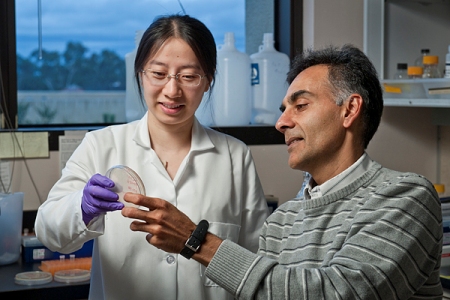In a research programme funded by a grant from biofuels company LS9, scientists at Stanford University are investigating the ability of E. coli to convert sugar into bio fuels. Traditionally, biodiesel is made from animal fat or plant oil.
 Xingye Yu, a graduate student in chemical engineering, and Professor Chaitan Khosla examine a culture of e. coli bacteria.
Xingye Yu, a graduate student in chemical engineering, and Professor Chaitan Khosla examine a culture of e. coli bacteria.
Though used cooking oil is commonly used for bio diesel, raw materials derived from plant sources are required to produce bio fuels on a large scale. Synthesising bio fuels is also a complicated process. However, E. coli has a natural ability to convert sugars into derivatives of fatty acids that are equal to the chemical properties of gasoline.
Though E. coli has a high conversion rate of fatty acids into fuel-like substances, the cells in E. coli control it tightly thus restricting it from performing efficiently. The research team from Stanford is presently focussing on methods to control the operation of cells. During the course of the study, scientists separated the enzymes from other molecules that are responsible for the creation of fatty acids and gathered them in a test tube. Through this method, the research team was able to study how the enzymes behaved when they were away from the cells.
Despite the fact that bio diesel has many advantages over ethanol in terms of the cost and ease to create bio diesel, density and lesser level of water solubility, it has been difficult to manufacture bio diesel on a large scale. If scientists succeed in creating bio diesels in such a manner, it can greatly help in fuelling large engines without affecting the environment.